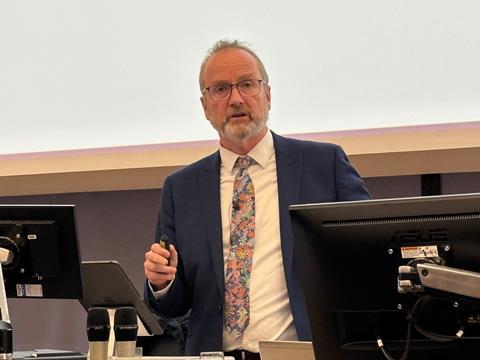Are solicitors at risk of behaving like zealots? That is the question raised last week by two leading academics specialising in professional ethics.

One is Stephen Mayson, honorary professor of law at UCL, who has recently updated his influential review of legal services regulation. The other is Richard Moorhead (pictured), professor of law and professional ethics at the University of Exeter, who raised the issue in the first of his Hamlyn lectures.

Lawyers must act in the public interest. They must also act in the interests of their clients. It is the potential clash between these two ideals that concerns Mayson. What should lawyers do if they are instructed to represent supposedly undesirable clients, such as kleptocrats? Should they lend their expertise to unworthy causes, for example those that cause environmental harm? Can lawyers properly support abusive non-disclosure agreements or threats of litigation that are intended to hide questionable behaviour or to silence critics?
‘In many cases,’ writes Mayson, ‘the proffered justification – that the lawyers involved are simply pursuing their professional duty to act in the best interests of their clients – does not sit well with the outcomes.’
Lawyers are not just ordinary market participants whose foremost obligation is to secure their clients’ interests, he argued. ‘Instead, they are members of a public profession and owe a primary duty to society to secure the public interest ahead of clients’ interests and self-interest.’
As Mayson told me in an interview on Tuesday, the current Post Office Inquiry has brought all this into sharp focus. Stephen Dilley, a solicitor in private practice, acted for the Post Office in a civil claim against Lee Castleton which resulted in the subpostmaster’s bankruptcy.
Asked at the Horizon public inquiry whether he had come under particular pressure from the Post Office to win what was seen as a key case, Dilley said: ‘We wanted, as you do with any client, to do your best by them – within, of course, the rules of the court and your professional ethics rules. And so, in an adversarial system, it is my absolute duty to do – to act in their best interest.’
In no sense can the duty to act in a client’s best interests be absolute, writes Mayson. It is just one of several regulatory objectives. This client-centred approach is described in academic circles as the ‘duty of zealous representation’.
For Moorhead, the Post Office scandal was ‘emblematic of how ethical and system failure can lead to profound injustice’. His three lectures on legal ethics were being delivered at what he called a critical juncture – ‘a moment of calamity for the legal profession and the legal system’. Moorhead’s theme is ‘frail professionalism’: the susceptibility of lawyers, individually and collectively, to make bad decisions.
‘Incompetence is part of this,’ he explained, but of more concern is ‘susceptibility to misconduct and the undermining of justice’.
In moral philosophy, he explained, ‘role-morality is the idea that the morality of one’s acts are determined by one’s role: surgeons can cut; soldiers can kill; and so on. The kind of role-morality most often associated with lawyers is zeal.
‘Zeal discourages reflection,’ Moorhead explained. ‘The failure to reflect makes us more likely to miss the time when our client does not have a right to make a claim; or we are taking unfair advantage; or our zealous interpretations become lies.’
Self-regarding, unaccountable lawyers relied on conventional but unbalanced ideas about professional partisanship, Moorhead argued. Their reasoning was influenced by money, secrecy and moral sophistry.
Aggressive lawyering had reportedly helped banks with off-balance-sheet accounting, systemic risk-taking and disguised commissions on share deals. ‘In each of these cases, choices can be presented as arguably legal,’ he said. ‘But they were often likely to be improper or criminal.’
What happened to the subpostmasters was an unparalleled tale of legal carnage, he believed. But none of it was surprising. ‘The story of the Post Office is a tale of awfulness but also of orthodoxies.’ It was not a few bad apples. Ethical failure was being driven by something closer to ordinary lawyering.
Delivering his first Hamlyn lecture in Exeter on Wednesday – and here I must declare an interest as a member of the organising committee – Moorhead said that Castleton ‘was made an example of, ruined deliberately or simply as the natural consequence of litigation’.
This week’s lecture will examine how ‘amoral, unreliable lawyering combines with unbalanced organisations’. His final lecture, in London, will argue that legal ethics relies, among other things, on better regulation. The announcement on Tuesday that the Legal Services Board is taking action against the Solicitors Regulation Authority should give him plenty to think about.
Most lawyers do not really think they are gods, Moorhead concluded. ‘But professional complacency, buttressed by privileged control of information and an ideology of zeal, magnifies the human frailties to which we are all prone.’
joshua@rozenberg.net































19 Readers' comments